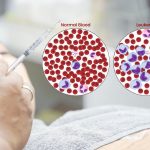Hemophilia is a rare and serious bleeding disorder that is linked to the X chromosome and is present from birth. It affects the blood’s ability to clot properly. Normally, when bleeding occurs, a group of 13 proteins called clotting factors work together to form a blood clot and stop the bleeding. However, in people with hemophilia, one of these clotting factors is either missing or present in low amounts, which disrupts the clotting process. As a result, they have difficulty forming blood clots, making it harder to stop bleeding when it occurs.
Prevalence of Hemophilia:
Worldwide, over 200,000 people live with some form of hemophilia. However, recent studies suggest that hemophilia might be underdiagnosed, with the actual number of people affected possibly exceeding 1.1 million globally. The condition predominantly affects individuals assigned to males at birth. In a study, individuals assigned female at birth represented approximately 18% of mild hemophilia cases and less than 1% of severe cases. Hemophilia is most commonly found in white and Hispanic patients and is less common among Black and Asian populations.
Most Common Types of Hemophilia:
- 80% of individuals with hemophilia have hemophilia A. Also named factor VIII (8) deficiency, it is caused by a lack of the clotting factor called factor VIII.
- 20% of individuals with hemophilia have hemophilia B. Also named factor IX (9) deficiency, it’s caused by a lack of factor IX
Mild, Moderate, or Severe Hemophilia: What Do They Mean?
- Mild 5-40%: Mild hemophilia is characterized by factor VIII or IX levels that range from 5% to 40% of the normal levels found in blood.
- Moderate 1-5%: Moderate hemophilia is characterized by factor VIII or IX levels that range between 1% and 5% of the normal amount found in blood.
- Severe <1%: Severe hemophilia is when a person has less than 1% of the normal levels of factor VIII or IX in their blood.
Signs and Symptoms:
Identifying the signs and symptoms of hemophilia is crucial for effective management. Symptoms can differ depending on your clotting factor levels and the severity of the condition. Common symptoms include:
- Swelling, pain, or a feeling of tightness in the joints, especially in the knees, elbows, or ankles.
- Bleeding after receiving injections can lead to muscle bleeds.
- Heavy or prolonged bleeding during menstruation.
- Bruising on the skin
- Blood in the urine or stool
- Low iron or anemia
- Bleeding in the mouth and gums that is hard to control
- Frequent, persistent, and hard-to-stop nosebleeds
How Do People Get Hemophilia?
Hemophilia is primarily inherited, meaning genetics play a significant role in developing hemophilia. But in some cases, it is acquired.
Most often, Hemophilia results from a mutation in one of the genes that provide instructions for making the clotting factor proteins. There are two main types of hemophilia: Hemophilia A, which is caused by a deficiency in clotting factor VIII, and Hemophilia B, which is due to a deficiency in clotting factor IX. These mutations typically occur on the X chromosome, making hemophilia more common in males, while females usually act as carriers.
In some patients acquired hemophilia may develop. This happens when a patient’s immune system mistakenly attacks clotting factors VIII. Acquired hemophilia can be associated with:
- Pregnancy
- Cancer
- Multiple sclerosis
- Drug interactions
- Autoimmune conditions such as lupus
Diagnosis and Living with Hemophilia:
Diagnosing hemophilia involves a series of blood tests that measure the clotting factor levels in the blood. If hemophilia is suspected, a doctor may perform tests such as the activated partial thromboplastin time (aPTT) test or specific factor assays to confirm the deficiency of factor VIII or IX.
Living with hemophilia requires careful management and awareness. People with hemophilia should avoid activities that could cause injuries, and they may need regular infusions of clotting factor concentrates to prevent bleeding episodes. With proper care, individuals with hemophilia can lead fulfilling lives, but they must be mindful of their condition and take precautions. Treatment typically involves regular infusions of clotting factors to replace the missing ones. With advancements in medical technology, gene therapy is also emerging as a promising treatment option.
Ikris Pharma`s Note on Hemophilia Awareness Campaign:
Hemophilia is a chronic condition that profoundly affects both individuals and their families. However, recent advancements are changing how hemophilia and other rare bleeding disorders are treated. With evolving treatment options, gene therapy is being investigated as a potential treatment option. At Ikris Pharma Network, we are dedicated to enhancing access to care, raising awareness, and improving the diagnosis and management of hemophilia. Our awareness campaign focuses on educating people about hemophilia to improve the quality of life for those affected and ensure they get the care they need.
There’s more to learn. Join us for additional education and resources on hemophilia; it’s easy as well as valuable.
What are the FDA-approved medicines for hemophilia treatment?
There are several FDA-approved medicines to manage hemophilia effectively. Medicines for hemophilia are Advate, Hemlibra (emicizumab-kxwh), NovoSeven RT (coagulation Factor VIIa, recombinant), Alprolix (Coagulation Factor IX), Idelvion, and Eloctate (efmoroctocog alfa). These medicines help replace or mimic the missing clotting factors. They reduce the risk of bleeding episodes. These treatments are available through the Indian Pharma Network (IPN). We offer global access to life-saving medicines.
What is Hemlibra, and how does it help hemophilia patients?
Hemlibra (emicizumab) is a monoclonal antibody designed to prevent bleeding episodes in patients with hemophilia A. It works by bridging activated factors IX and X, compensating for the missing factor VIII. Hemlibra offers a more convenient treatment regimen and is FDA-approved for hemophilia A patients with or without inhibitors.
How does Advate help in managing hemophilia A?
Advate (antihemophilic factor, recombinant) is a clotting factor VIII replacement therapy for individuals with hemophilia A. It is used to prevent and control bleeding episodes or manage perioperative bleeding. Regular infusions of Advate can help reduce the frequency of bleeding events and improve the quality of life for patients.
What is NovoSeven RT, and who can use it?
NovoSeven RT (coagulation factor VIIa, recombinant) is FDA-approved for treating bleeding episodes in patients with hemophilia A or B with inhibitors, acquired hemophilia, or Glanzmann’s thrombasthenia. It helps restore clotting ability in patients who cannot respond to standard clotting factor therapies.
Where can I buy FDA-approved hemophilia medicines?
Indian Pharma Network (IPN) facilitates the legal supply of FDA-approved hemophilia medicines, such as Advate, Hemlibra, NovoSeven RT, Alprolix, Idelvion, and Eloctate. Patients, Healthcare Professionals, Hospitals, or Institutions can legally access these life-saving medicines through IPN. Kindly inquire about your medicines via Call/WhatsApp: +91 9310090915.






